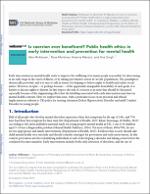Chapter Is coercion ever beneficent?
Public health ethics in early intervention and prevention for mental health
Author(s)
McKeown, Alex
Mortimer, Rose
Manzini, Arianna
Singh, Ilina
Collection
WellcomeLanguage
EnglishAbstract
Early intervention in mental health seeks to improve the wellbeing of as many people as possible, by intervening at an early stage in the onset of illness, or by taking preventative action in ‘at risk’ populations. The paradigm is rhetorically powerful, and it is easy to talk in terms of it helping to deliver rights to health and realise social justice. However, in spite – or perhaps because – of the apparently unarguable desirability of such goals, it is harder to discuss rights to dissent. In this respect the risk of coercion is an issue that should be discussed, especially because of the stigmatizing effect that the labelling associated with early intervention may have in mental health contexts. Here we explore this issue, with a particular focus on its practical and ethical implications in relation to UK policy for treating Attention Deficit Hyperactivity Disorder and mild Conduct Disorder in young people.
Keywords
mental health; public health; ethicsISBN
9780128167564Publisher
Elsevier/Academic PressPublication date and place
2019Grantor
Classification
Mental health services


 Download
Download